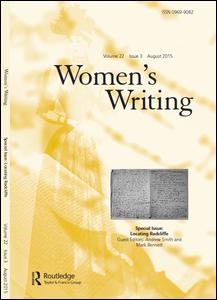
Women's Writing
Volume 21, Issue 4, Oct 2014
Pages 540-558
- DOI: 10.1080/09699082.2013.864152
- Print ISSN: 0969-9082
- Online ISSN: 1747-5848
Felicia Hemans's Feminist Poetry Of The Mid 1820S
During the mid 1820s, Felicia Hemans became an ardent, if conflicted, feminist who wrote two long poems and several shorter ones in which she railed thrillingly against the mortal dangers for British families inherent in the testosterone-driven ideology of manly patriotic sacrifice, and argued instead for the life-giving and life-restoring power to be found in woman-centered, but regendered, images of home, community and peace. The author concentrates on two major works: The Siege of Valencia (1823), Hemans's most often misunderstood long poem, and The Forest Sanctuary (1825), in which she takes her vision of a regendered future the furthest. However, the author also examines several of her short lyrics, including the two best known—“Casabianca” (1826) and “The Homes of England” (1827)—along with a few of the harrowing suicide poems from Records of Woman (1828), where aggrieved women dramatically kill themselves (and sometimes their children) to express rage and despair against the men in their lives. Whatever stories these poems tell, and however much her feminism flew beneath both the popular and critical radar, they radiate excoriating irony directed towards the patriarchal establishment of her time.